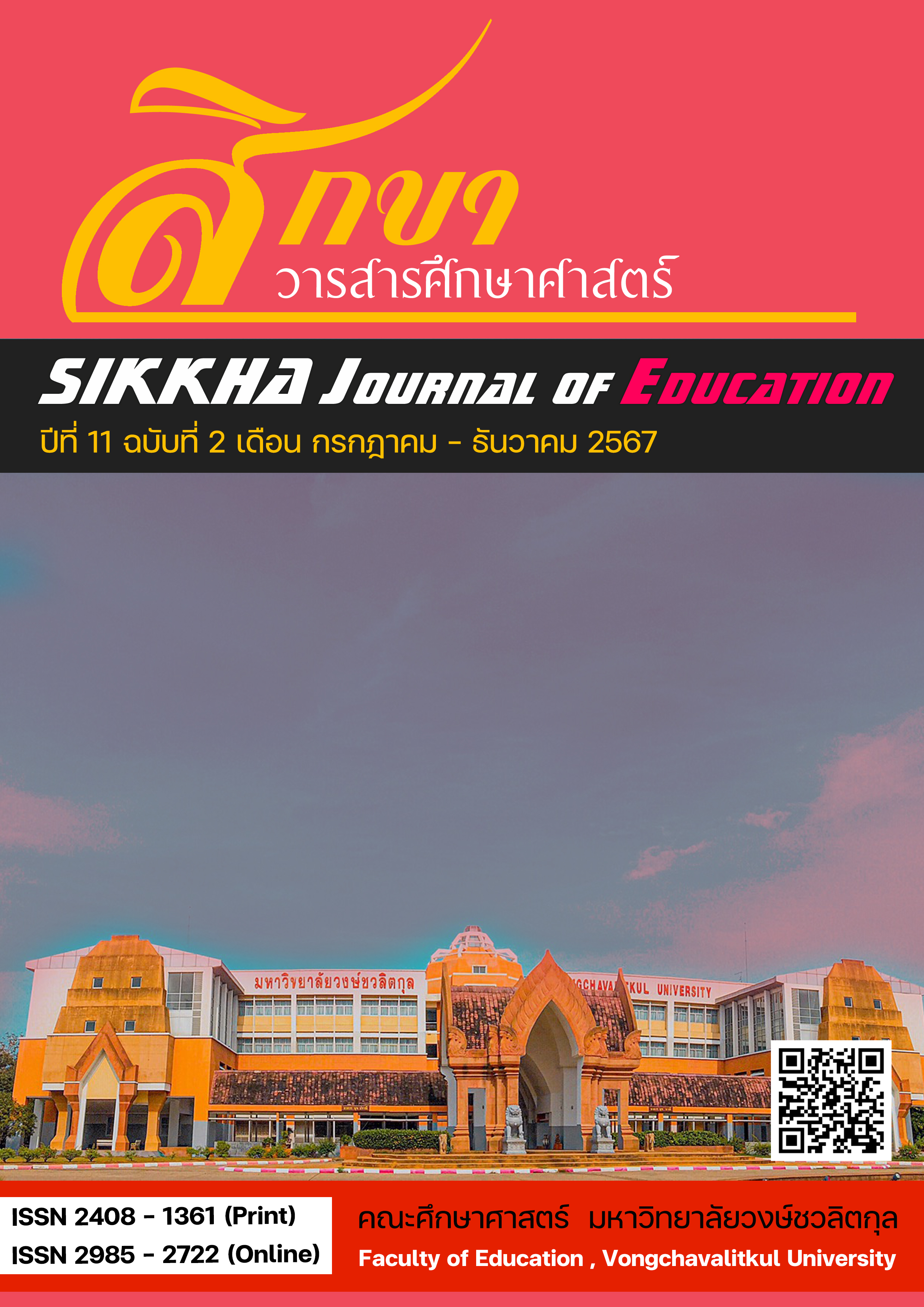รูปแบบการพัฒนาภาวะผู้นำทางวิชาการในศตวรรษที่ 21 สำหรับผู้บริหารโรงเรียนขนาดเล็ก สังกัดสำนักงานเขตพื้นที่การศึกษาประถมศึกษา ภาคตะวันออกเฉียงเหนือตอนล่าง 1
คำสำคัญ:
รูปแบบการพัฒนา, ภาวะผู้นำทางวิชาการ, ศตวรรษที่ 21, โรงเรียนขนาดเล็กบทคัดย่อ
การวิจัยมีวัตถุประสงค์ เพื่อ 1) ศึกษาระดับภาวะผู้นำทางวิชาการในศตวรรษที่ 21 สำหรับผู้บริหารโรงเรียนขนาดเล็ก 2) สร้างรูปแบบการพัฒนาภาวะผู้นำทางวิชาการในศตวรรษที่ 21 สำหรับผู้บริหารโรงเรียนขนาดเล็ก และ 3) ประเมินความเป็นไปได้และความเป็นประโยชน์ของรูปแบบ การวิจัยมี 3 ระยะคือ ระยะที่ 1 การศึกษาระดับภาวะผู้นำทางวิชาการในศตวรรษที่ 21 มี 2 ขั้นตอน คือ ขั้นตอนที่ 1 การศึกษาองค์ประกอบภาวะผู้นำทางวิชาการในศตวรรษที่ 21 โดยสังเคราะห์องค์ประกอบ และยืนยันองค์ประกอบโดยผู้เชี่ยวชาญ จำนวน 5 คน ขั้นตอนที่ 2 การศึกษาระดับภาวะผู้นำทางวิชาการในศตวรรษที่ 21 จากกลุ่มตัวอย่างจำนวน 320 คน โดยการสุ่มแบบหลายขั้นตอน โดยใช้แบบสอบถามมาตราส่วนประมาณค่า ที่มีค่าความเชื่อมั่น 0.98 ระยะที่ 2 การสร้างรูปแบบการพัฒนาภาวะผู้นำทางวิชาการในศตวรรษที่ 21 โดยนำผลการศึกษาระดับภาวะผู้นำทางวิชาการในศตวรรษที่ 21 มาเป็นประเด็นเป้าหมายในการจัดทำรูปแบบ แล้วจัดสนทนากลุ่มและประเมินความเหมาะสมของรูปแบบโดยผู้ทรงคุณวุฒิ จำนวน 7 คน โดยใช้แบบประเมินความเหมาะสมของรูปแบบ ระยะที่ 3 การประเมินความเป็นไปได้และความเป็นประโยชน์ของผู้บริหารโรงเรียนขนาดเล็ก จำนวน 30 คน โดยการเลือกแบบเจาะจง โดยใช้แบบประเมินความเป็นไปได้และความเป็นประโยชน์ สถิติที่ใช้ในการวิเคราะห์ข้อมูล คือ ค่าเฉลี่ย และส่วนเบี่ยงเบนมาตรฐาน
ผลการวิจัยพบว่า 1) ระดับภาวะผู้นำทางวิชาการในศตวรรษที่ 21 สำหรับผู้บริหารโรงเรียนขนาดเล็ก โดยภาพรวมมีค่าเฉลี่ยอยู่ในระดับมาก เมื่อพิจารณาแต่ละด้าน พบว่า มีค่าเฉลี่ยอยู่ในระดับมากทุกด้าน โดยมีด้านการเสริมสร้างการมีส่วนร่วมมีค่าเฉลี่ยสูงสุด รองลงมาเป็นด้านการกำหนดวิสัยทัศน์ ด้านการส่งเสริมและพัฒนาเทคโนโลยีสารสนเทศและการสื่อสาร ด้านการพัฒนาการเรียนการสอน ด้านการส่งเสริมและพัฒนาครู และด้านการพัฒนาหลักสูตรสถานศึกษา ตามลำดับ 2) รูปแบบการพัฒนาภาวะผู้นำทางวิชาการในศตวรรษที่ 21 สำหรับผู้บริหารโรงเรียนขนาดเล็ก ประกอบด้วย 5 องค์ประกอบ คือ (1) หลักการและเหตุผล (2) วัตถุประสงค์ของรูปแบบ (3) สาระสำคัญของการพัฒนา (4) การนำรูปแบบสู่การปฏิบัติ และ (5) เงื่อนไขสู่ความสำเร็จ การประเมินความเหมาะสมของรูปแบบ โดยภาพรวม มีค่าเฉลี่ยอยู่ในระดับมากที่สุด 3) ผลการประเมินความเป็นไปได้และความเป็นประโยชน์ของรูปแบบ พบว่า ความเป็นไปได้ โดยภาพรวมมีค่าเฉลี่ยอยู่ในระดับมากที่สุด ส่วนความเป็นประโยชน์ โดยภาพรวมมีค่าเฉลี่ยอยู่ในระดับมากที่สุด
เอกสารอ้างอิง
กนกอร สมปราชญ์. (2561). ภาวะผู้นำกับคุณภาพสถานศึกษา (Leadership and School). โรงพิมพ์มหาวิทยาลัยขอนแก่น.
กิตติชัย โคงัน. (2560). การพัฒนาตัวบ่งชี้ภาวะผู้นำทางวิชาการของผู้บริหารสถานศึกษาระดับประถมศึกษาในศตวรรษที่ 21 สังกัดสำนักงานคณะกรรมการการศึกษาขั้นพื้นฐานในภาคตะวันออกเฉียงเหนือ [วิทยานิพนธ์ปริญญาดุษฎีบัณฑิต]. มหาวิทยาลัยราชภัฏอุดรธานี.
ครรชิต ชัยกิจ, ละเอียด จงกลนี และจุฬาพรรณ ภรณ์ธนะแพทย์. (2563). ภาวะผู้นำทางวิชาการและพุทธวิธีในการจัดการศึกษา. วารสารวิชาการธรรมทรรศน์, 10(2), 165-175.
ครรชิต ชัยกิจ, ละเอียด จงกลนี และจุฬาพรรณ ภรณ์ธนะแพทย์. (2564). รูปการพัฒนาภาวะผู้นำทางวิชาการของผู้บริหารโรงเรียนเอกชน ตามหลักธรรมพรหมวิหาร 4 สังกัดสำนักงานศึกษาธิการ ภาค 12 [วิทยานิพนธ์ปริญญาดุษฎีบัณฑิต]. มหาวิทยาลัยมหาจุฬาลงกรณราชวิทยาลัย.
จิรัฐิติกาล สุทธานุช. (2564). องค์ประกอบและตัวบ่งชี้ภาวะผู้นำทางวิชาการในศตวรรษที่ 21 ของผู้บริหารสถานศึกษา สังกัดสำนักงานคณะกรรมการการศึกษาขั้นพื้นฐาน ในภาคตะวันออกเฉียงเหนือ [วิทยานิพนธ์ปริญญาดุษฎีบัณฑิต]. มหาวิทยาลัยวงษ์ชวลิตกุล.
ธนกฤต โชติภักดีโภคิน. (2564). รูปแบบการพัฒนาภาวะผู้นำของคณะกรรมการองค์การนักวิชาชีพในอนาคตแห่งประเทศไทยในศตวรรษที่ 21 อาชีวศึกษาในภาคตะวันออกเฉียงเหนือ [วิทยานิพนธ์ปริญญาดุษฎีบัณฑิต]. มหาวิทยาลัยวงษ์ชวลิตกุล.
ปณตนนท์ เถียรประภากุล. (2561). ภาวะผู้นำของผู้บริหารสถานศึกษาในยุคการศึกษา 4.0. วารสารวิชาการ Veridian E-Journal, Silpakorn University ฉบับภาษาไทย สาขามนุษยศาสตร์ สังคมศาสตร์ และศิลปะ, 11(2), 1994-2013.
พรปวีณ์ ไกรบำรุง. (2564). รูปแบบการพัฒนาทักษะการบริหารในศตวรรษที่ 21 ของผู้บริหารสถานศึกษา สังกัดสำนักงานเขตพื้นที่การศึกษาประถมศึกษา ในภาคตะวันออกเฉียงเหนือตอนล่าง 1 [วิทยานิพนธ์ปริญญาดุษฎีบัณฑิต]. มหาวิทยาลัยวงษ์ชวลิตกุล.
พระมหาธีรเพชร มาตพงษ์. (2561). การสังเคราะห์รูปแบบการบริหารงานวิชาการโรงเรียนพระปริยัติธรรมแผนกสามัญ [วิทยานิพนธ์ปริญญาดุษฎีบัณฑิต]. มหาวิทยาลัยสยาม.
ไพโรจน์ วชิรินทราวัฒน์. (2565). รูปแบบการพัฒนาสมรรถนะที่จำเป็นของครูในยุคไทยแลนด์ 4.0 ของสถานศึกษา สังกัดสำนักงานเขตพื้นที่การศึกษาประถมศึกษาจังหวัดกำแพงเพชร [วิทยานิพนธ์ปริญญาดุษฎีบัณฑิต]. มหาวิทยาลัยราชภัฏกำแพงเพชร.
วิเชียร ทองคลี่. (2560). รูปแบบการพัฒนาภาวะผู้นำทางวิชาการของผู้บริหารสถานศึกษาในศตวรรษ ที่ 21 สังกัดสำนักงานเขตพื้นที่การศึกษามัธยมศึกษา [วิทยานิพนธ์ปริญญาดุษฎีบัณฑิต]. มหาวิทยาลัยราชภัฏนครราชสีมา.
สมาน อัศวภูมิ. (2561). การนำเสนอรูปแบบการประเมินและรับรองคุณภาพวารสารทางการศึกษาในประเทศไทย: การศึกษาความคิดเห็นของผู้มีส่วนได้เสีย. วารสารบริหารการศึกษาบัวบัณฑิต, 18(1), 631-642.
สำนักงานคณะกรรมการการศึกษาขั้นพื้นฐาน. (2564). แผนบริหารจัดการโรงเรียนขนาดเล็ก ปี พ.ศ. 2562-2565. สำนักงานคณะกรรมการการศึกษาขั้นพื้นฐาน, กระทรวงศึกษาธิการ.
สุกฤตยา ปงกันทา. (2561). กลยุทธ์การพัฒนาผู้บริหารสถานศึกษามืออาชีพ สังกัดสำนักงานเขตพื้นที่การศึกษาประถมศึกษากำแพงเพชร เขต 1 และเขต 2 [วิทยานิพนธ์ปริญญาดุษฎีบัณฑิต]. มหาวิทยาลัยราชภัฏกำแพงเพชร.
สุทธิวรรณ ตันติรจนาวงศ์. (2560). ทิศทางการจัดการศึกษาในศตวรรษที่ 21. วารสารวิชาการ Veridian E-Journal, Silpakorn University ฉบับภาษาไทย สาขามนุษยศาสตร์ สังคมศาสตร์ และศิลปะ, 10(2), 2843-2854.
ดาวน์โหลด
เผยแพร่แล้ว
รูปแบบการอ้างอิง
ฉบับ
ประเภทบทความ
สัญญาอนุญาต
ลิขสิทธิ์ (c) 2024 สิกขา วารสารศึกษาศาสตร์

อนุญาตภายใต้เงื่อนไข Creative Commons Attribution-NonCommercial-NoDerivatives 4.0 International License.



